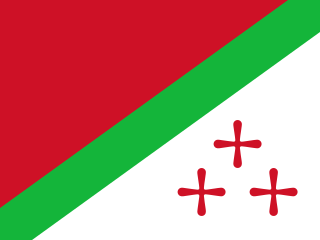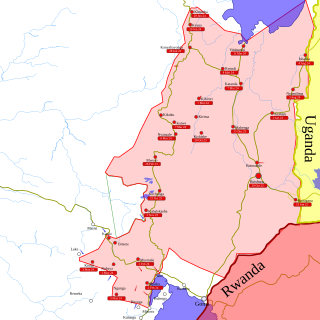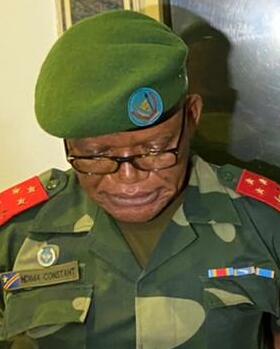
The United Nations Organization Stabilization Mission in the Democratic Republic of the Congo, or MONUSCO, is a United Nations peacekeeping force in the Democratic Republic of the Congo (DRC). At the request of the DRC's government, it is withdrawing completely from the country by the end of 2024.

The Allied Democratic Forces is an Islamist rebel group in Uganda and the Democratic Republic of the Congo (DRC). It considered a terrorist organisation by the Ugandan government and the United States. It was originally based in western Uganda but has expanded into the neighbouring DRC. Most Ugandan ADF fighters are Muslims from the Baganda and Basoga ethnic groups.

The Ituri conflict is an ongoing low intensity asymmetrical conflict between the agriculturalist Lendu and pastoralist Hema ethnic groups in the Ituri region of the north-eastern Democratic Republic of the Congo (DRC). While the two groups had fought since as early as 1972, the name "Ituri conflict" refers to the period of intense violence between 1999 and 2003. Armed conflict continues to the present day.

The Front for Patriotic Resistance in Ituri is a Bunia-based armed militia and political party primarily active in the south of the Ituri Province of northeastern Democratic Republic of the Congo.

Germain Katanga, also known as Simba, is a former leader of the Patriotic Resistance Force in Ituri (FRPI), an armed group in the Ituri Province of the Democratic Republic of the Congo (DRC). On 17 October 2007, the Congolese authorities surrendered him to the International Criminal Court (ICC) to stand trial on six counts of war crimes and three counts of crimes against humanity. The charges include murder, sexual slavery, rape, destruction of property, pillaging, willful killing, and directing crimes against civilians.

The Kivu conflict is an umbrella term for a series of protracted armed conflicts in the North Kivu and South Kivu provinces in the eastern Democratic Republic of the Congo which have occurred since the end of the Second Congo War. Including neighboring Ituri province, there are more than 120 different armed groups active in the eastern Democratic Republic of Congo. Currently, some of the most active rebel groups include the Allied Democratic Forces, the Cooperative for the Development of the Congo, the March 23 Movement, and many local Mai Mai militias. In addition to rebel groups and the governmental FARDC troops, a number of national and international organizations have intervened militarily in the conflict, including the United Nations force known as MONUSCO, and an East African Community regional force.
Mathieu Ngudjolo Chui is a colonel in the Congolese army and a former senior commander of the National Integrationist Front (FNI) and the Patriotic Resistance Force in Ituri (FRPI).
The assault on Bogoro, which occurred on February 24, 2003, was an attack on the village of Bogoro in the Democratic Republic of the Congo (DRC) by the Nationalist and Integrationist Front (FNI) and the Front for Patriotic Resistance of Ituri (FRPI). The attackers allegedly went on an "indiscriminate killing spree", killing at least 200 civilians, imprisoning survivors in a room filled with corpses, and sexually enslaving women and girls. Two rebel leaders, Germain Katanga and Mathieu Ngudjolo Chui, have been charged by the International Criminal Court with war crimes and crimes against humanity over their alleged role in planning the attack.

The March 23 Movement, often abbreviated as M23 and also known as the Congolese Revolutionary Army, is a Congolese rebel military group. Based in eastern areas of the Democratic Republic of the Congo (DRC), it operates mainly in the province of North Kivu, which borders both Uganda and Rwanda. The M23 rebellion of 2012 to 2013 against the DRC government led to the displacement of large numbers of people. On 20 November 2012, M23 took control of Goma, a provincial capital with a population of a million people, but it was requested to evacuate it by the International Conference on the Great Lakes Region because the DRC government had finally agreed to negotiate. In late 2012, Congolese troops, along with UN troops, retook control of Goma, and M23 announced a ceasefire and said that it wanted to resume peace talks.

Mai-Mai Kata Katanga, also called Mai-Mai Bakata Katanga, is a mai-mai rebel group in the Democratic Republic of the Congo which advocates the independence of the Congo's Katanga Province. It was formed shortly after the group's leader, Gédéon Kyungu Mutanga, escaped from prison in September 2011 where he was serving a sentence for crimes against humanity committed by his supporters between 2002 and 2006 in central Katanga. Kata Katanga means "cut [e.g. secede] Katanga" in Swahili. It has been estimated that, at its height in 2013, the Kata Katanga rebels numbered approximately 3,000 of whom most were based in Mitwaba Territory.
The Land Forces, also called the Congolese Army, are the land warfare component and the largest branch of the Armed Forces of the Democratic Republic of the Congo (FARDC).

The Katanga insurgency is an ongoing rebellion by a number of rebel groups in the Democratic Republic of the Congo, some of which aim for the creation of a separate state within Katanga. While the insurgency has been active in various forms since 1963, insurgent groups have recently redoubled their efforts after the 2011 jail break that freed Gédéon Kyungu Mutanga, who commanded the majority of the Katangese separatist groups until his surrender to Congolese authorities in October 2016.
The following lists events that happened during 2015 in the Democratic Republic of the Congo.
The Popular Front for Justice in the Congo is an armed group operating in the south of Ituri Province in the Democratic Republic of the Congo (DRC), where it has participated in the Ituri conflict. It formed in September 2008 from a splintering of the Front for Patriotic Resistance in Ituri (FRPI) and coalescing of other armed actors, including combatants from the Nationalist and Integrationist Front, who had resisted national disarmament campaigns. The group has expressed opposition to a 2006 attempt to resolve the Ituri conflict, which granted amnesty to former participants in the conflict. In 2011, the group was estimated to have no more than 100 members. Whereas the FRPI was closely linked to the Ngiti ethnolinguistic group, the FPJC incorporated members of more varied ethnic backgrounds.
The 2017 CNPSC offensive was a military offensive launched by rebels of the National Coalition of the People for the Sovereignty of Congo (CNPSC) on 30 June 2017 against security forces of the Democratic Republic of the Congo and MONUSCO. The goal of the offensive was to capture major settlements, mainly in South Kivu province in order to raise support for a popular uprising against then-president Joseph Kabila, who the coalition had deemed as an illegitimate president.

CODECO is a loose association of various Lendu militia groups operating within the Democratic Republic of the Congo (DRC). The name is an abbreviation of the group's lesser-known full name, the Cooperative for Development of the Congo, sometimes also styled the Congo Economic Development Cooperative.

In late March 2022, the March 23 Movement (M23), supported by Rwanda, launched an offensive in North Kivu against the Armed Forces of the Democratic Republic of the Congo (FARDC) and MONUSCO. The fighting displaced hundreds of thousands of civilians and caused renewed tensions between the Democratic Republic of the Congo and Rwanda.

Constant Ndima Kongba is a Congolese military officer who served as the military governor of North Kivu from May 2021 to September 2023. Before this appointment, he had served in high-ranking positions in the Armed Forces of the Democratic Republic of the Congo (FARDC). In the Second Congo War (1998–2003), Ndima was a commander in the Movement for the Liberation of the Congo; in this role, he was involved in Operation Effacer le tableau, a campaign that resulted in genocidal massacres.
On October 24, 2020, militants from CODECO-ALC attacked Congolese and MONUSCO forces in the town of Dele, Ituri Province, Democratic Republic of the Congo. In response, Congolese forces launched an offensive against CODECO-ALC, capturing several towns from the group and killing its leader Mountain Wolf.











